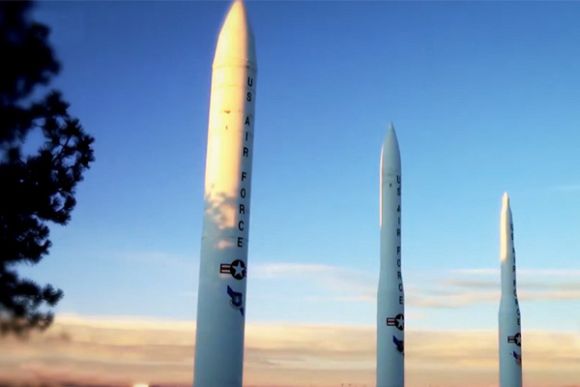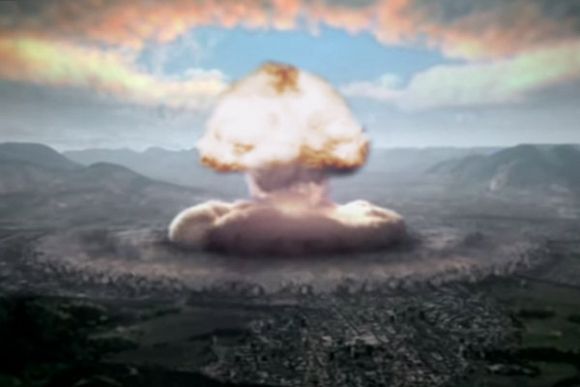A treaty designed to ban nuclear weapons has become a major step in the elimination of global nuclear arms, writes Dave Sweeney.
2020 HAS BEEN a very tough year with fires, pestilence and massive economic and human disruption but amid the difficulties, an Australian-born initiative is steadily growing global support and offers our shared planet its best way to get rid of its worst weapons.
In October 2017, the International Campaign to Abolish Nuclear Weapons (ICAN), an initiative born in Melbourne and adopted, adapted and applied around the world, was awarded the 2017 Nobel Peace Prize.
This was in recognition of its:
“...work to draw attention to the catastrophic humanitarian consequences of any use of nuclear weapons and for its ground-breaking efforts to achieve a treaty-based prohibition of such weapons.”
Fast forward to October 2020 and the Treaty on the Prohibition on Nuclear Weapons has just cleared a big hurdle. Despite strong pressure from the nuclear weapons states, especially the U.S., 50 nations have now ratified the ban treaty. It will enter into force and become part of international humanitarian law on 22 January 2021.
At a time when the threat of nuclear war is more explicit than it has been in decades, the ICAN story is timely and shows the power of both the individual and the idea. When ICAN started in 2007, its founders could have fitted in a minibus. Ten years later, there are over 500 ICAN groups and formal partners in more than 100 nations. And a treaty.
The public unveiling of the nuclear weapons era in August 1945 brought the end of many lives and the awareness that all remaining life was now living in the nuclear shadow. Nuclear weapons are the most destructive force on Earth and, along with unchecked climate change, they pose an existential threat to our shared planet. These twin threats have seen the annual Doomsday Clock, which measures our species proximity to disaster, move to 100 seconds to midnight closer than at any other time in history.
Nuclear weapons have held nations to ransom, fuelled a Cold War, diverted vast financial resources and scientific capacity from meeting pressing human needs, been the stuff of science fiction, pop culture and nightmares and remain a literal cancer on the global body politic. Through a combination of good hearts and good luck, nuclear weapons have not been used in war since 1945 — but they have been threatened, scrambled, tested and lost.
And they have always been challenged. There is an important, proud and powerful tradition of protest, opposition and action. ICAN has grown and stood on the shoulders of all who have earlier championed an end and will be a platform for those who will take the story and the struggle forward. It is very hard to take the sticks from the biggest kids in the schoolyard and diplomatic efforts to wind back the nuclear clock have failed or been derailed or constrained.
Institutional barriers to real disarmament are very high and include the hypocrisy of the nuclear-armed permanent members of the U.N. Security Council, the political clout and donations of the weapons corporations and the simultaneous flag-waving and hand-wringing of many politicians.
In order to gain and maintain momentum for change, ICAN’s approach has been to bypass these barriers. ICAN is not seeking to convince the nuclear weapons states, but rather to isolate them. Modelled on the approach taken around chemical and biological weapons, the new ban doesn’t seek the approval of the nuclear weapons states. Instead, it aims to shrink any legitimacy these weapons and their defenders may have or claim.
The ban treaty is brief, comprehensive and powerful.
Key provisions include:
- a prohibition on developing, testing, producing, manufacturing, acquiring, possessing, transferring, stockpiling, using and threatening to use nuclear weapons;
- a prohibition on assisting, encouraging or inducing anyone to participate in any of the above activities;
- recognition of the disproportionate impact of nuclear weapons activities on Indigenous peoples and on women and girls; and
- an obligation for all states' parties to provide victim assistance and take measures towards environmental remediation.
In an increasingly fractured, complicated and nuanced global geopolitical landscape, nuclear weapons are an unwieldy and obsolete defence tool with scant strategic purpose. Any strategic rationale that might arguably have existed when the world was divided between two superpowers who shared a common adherence to the mad concept of mutually assured destruction is gone.
We live in a world where Stanley knives on commercial planes and stolen cars in public places are the new weapons of terror. Nuclear weapons do not promote security, they fatally undermine it. They are obscene and weapons of indiscriminate and mass destruction that have no place on a living planet. And now they are illegal.
This treaty provides our planet’s best chance to get rid of its worst weapons. Unlike the Federal Government, Labor and the Greens support the treaty. The Australian Government now needs to realise that the momentum towards ending nuclear weapons is strong, supported and sane.
ICAN Australia noted in its response to the Peace Prize:
“This award shines a needed light on the path the ban treaty provides towards a world free of nuclear weapons. Before it is too late, we must take that path.”
Australia now needs to sign on to what is literally a global smoking ban. Our politicians need to raise their hands against nuclear arms, quit the excuses and butt out nuclear weapons.
Dave Sweeney is the Australian Conservation Foundation's nuclear-free campaigner and was a founding member of ICAN. You can follow him on Twitter @nukedavesweeney.
Related Articles
- Nuclear power: A gargantuan threat
- HELEN CALDICOTT: Small modular reactors — a radioactive idea
- New nuclear legislation set to provide toxic dumping ground in South Australia
- 75 years after Hiroshima and Nagasaki, the arms race isn't over
- Transporting nuclear wastes across Australia in the age of bushfires
 This work is licensed under a Creative Commons Attribution-NonCommercial-NoDerivs 3.0 Australia License
This work is licensed under a Creative Commons Attribution-NonCommercial-NoDerivs 3.0 Australia License
Support independent journalism Subscribe to IA.














